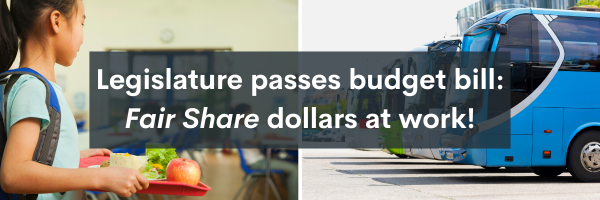
Today the legislature passed a budget bill for Fiscal Year 2024. The $56.26 billion budget now goes to Governor Healey, who can sign the bill or use her veto powers. Enabled by new revenue from the Fair Share Amendment that the voters passed last November, the FY2024 budget makes important investments in education and transportation. These investments show what can be accomplished when the Commonwealth raises the revenue it needs from those best able to afford it. These investments in higher-quality, more accessible education and transportation will make our Commonwealth more competitive.
The Fair Share Amendment (FSA) amended the state constitution to include a 4 percent surtax on taxable income over $1 million to support education and transportation. This money cannot be used for any other purpose, as the constitution requires it to be spent on education and transportation. The legislature took important steps toward protecting Fair Share investments by creating a dedicated fund to hold money collected under FSA and by using a separate section of the budget to detail how Fair Share dollars are spent.
Fiscal Year 2024, which started July 1, 2023, is the first state budget to include Fair Share dollars. The budget bill passed today reconciles differences in how the House and Senate proposed spending the new revenue. Nearly $524 million in Fair Share dollars will go to early education and care, K-12 districts, and higher education, and nearly $477 million will improve our roads and bridges and support both the MBTA and Regional Transit Authorities. Residents across Massachusetts will benefit from these investments.
| FY2024 Fair Share Spending | |
|---|---|
| Category | Amount |
| Education | $523,500,000 |
| Transportation | $476,500,000 |
| Total | $1,000,000,000 |
MassBudget will update our Budget Browser in the coming days to include numbers from the Conference Committee report for all spending items. The Browser allows users to view the effect of inflation on each item, which is important because any spending item that does not keep up with inflation is effectively a cut in support. The Budget Browser also adjusts for intragovernmental transfers and tuition remission back to the Commonwealth by public colleges and universities.
To see differences in how the Governor, House, and Senate proposed to invest the first $1 billion in Fair Share Revenue, see MassBudget’s, “How Will We Spend Fair Share Dollars? Competing Proposals Highlight Needs and Opportunities.”





